Longest Bridge in the U.S. Provides Personal Best for Angler
Keith Lusher 08.05.24

Built in 1969, the Lake Pontchartrain Causeway stretches 24 miles and is the longest bridge in the US. The bridge holds a special place in my heart as it provided my entire family with a route to the city when commuting to work in New Orleans. But traveling to and from work isn’t all the bridge is good for. The bridge is often called the “24-mile reef” by anglers who enjoy fishing underneath the bridge.
I made a trip with a gentleman who has fished the Causeway all his life. George Patterson was born in Lacombe, LA, and has been pulling fish off the bridge since he was a teen. The 62-year-old has caught speckled trout, croaker, flounder, and almost any other inshore fish you can think of along the bridge. So when I was asked to join him on his latest fishing adventure at the bridge, I jumped at the chance.
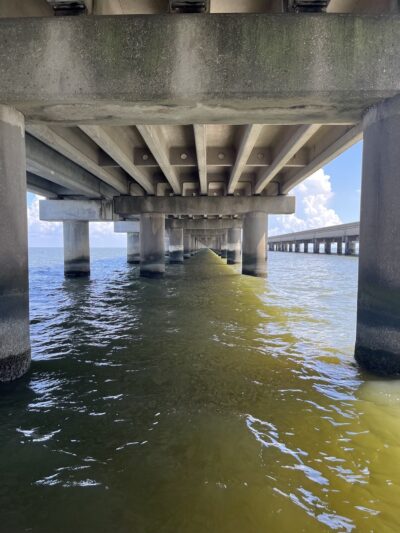
We started our day at Mandeville Harbor which is located on the Northshore of Lake Pontchartrain. After a quick 15-minute boat ride in Patterson’s 24-foot Fishmaster, we reached a section of the bridge where he had been catching redfish.
The winds were blowing out of the southeast at 10 MPH which is just right for fishing the lake. The water was abeatuful clear-green with 3-foot visibility. Patterson threw down his trolling motor and positioned the boat underneath the bridge. I sat and watched him to try and understand his technique.
Those who fish this bridge know that there always seems to be a pattern when casting in the concrete pilings. Most anglers use a trolling motor to fish the outside of the bridge. But Patterson fishes the bridge a little differently. He positions his bay boat underneath the bridge directly in between the 40-foot gap between each set of pilings. Then he casts north and south, in between the 6-foot gaps.
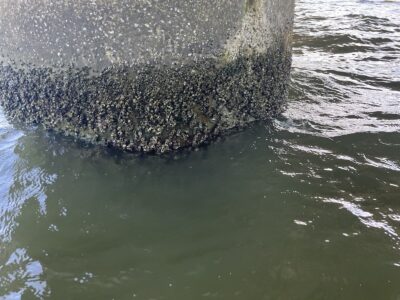
Patterson said the closer you can get to pilings, the better. “The reds are circling the concrete pilings looking for food in the barnacles,” he said. “Most of the fish I’m catching are coming when my lure lands close to the piling.” While his pattern of casting close to the piling yields redfish, there is one problem. “When a big bull red jumps on I have to wrestle him out of the pilings quickly or he will break my line when the braid rubs against the barnacles on the concrete.”Patterson uses a 30-pound braid to make this happen.
After a few casts, Patterson leaned back and set the hook on the day’s first fish. He battled the fish for about 3 minutes and when the redfish approached the boat, I netted it. It was a 30-inch bull red which we had to return to the lake because of LA’s new redfish restriction that prohibits the harvesting of any redfish over 27 inches.
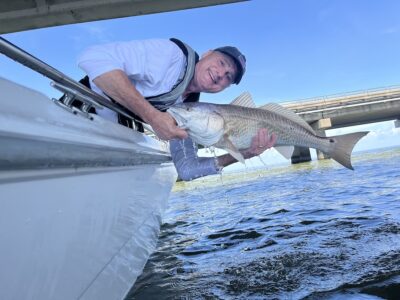
After watching Patterson catch another redfish I was ready to try my hand at it. I tied on a 1/2-ounce jighead and threaded on a 4-inch Gulp Powerbait Bonga Shrimp. I made a cast lateral with the bridge in between a set of pilings and started bumping the shrimp along the bottom. After several casts Patterson put two more fish in the boat and I began to get frustrated
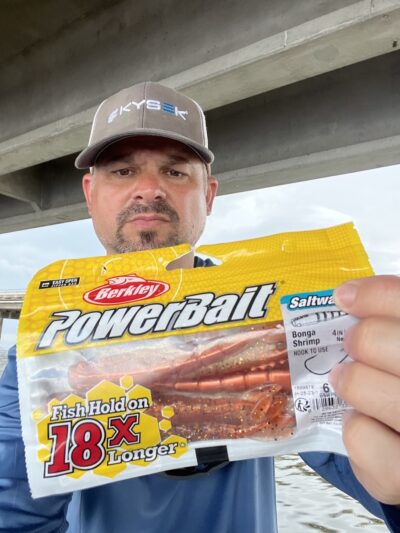
Then it happened! After casting up against a piling, I let the shrimp sink to the bottom and went to bump it but it didn’t budge. My line drifted sideways and I set the hook. Fortunately for me, the fish swam away from the bridge and out into the open water. Patterson jumped on the trolling motor and followed after it. The reel screamed for over a minute and that’s when I realized I had something special on the line. I continued to battle the fish for over 15 minutes with the fish stripping line and me reeling it back in over and over. It made 5 circles around the boat and I had to dip my pole under the trolling motor and the main motor several times. As the beast of a fish neared the boat, Patterson grabbed the net and I glided it into the net on the first try. We both grabbed the net and lifted the trophy over the gunwale.
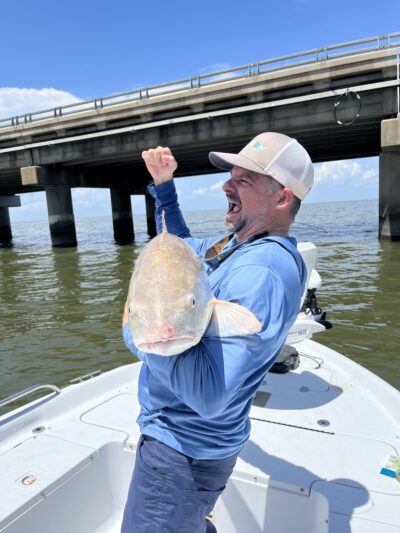
The 42-inch redfish was a personal best for me. Now, I caught redfish in the Gulf of Mexico. I’ve caught them in Venice, and I’ve caught them on the Texas Coast. But to have my personal best redfish come off a bridge that’s only 10 miles from New Orleans is something that I never expected.
The summer redfish bite should continue throughout the rest of the summer. Patterson said he’ll continue to fish for the giant redfish until the cold fronts begin to arrive in October. “These fish will be here for a while so there’s plenty of time to catch these trophies,” he said.

